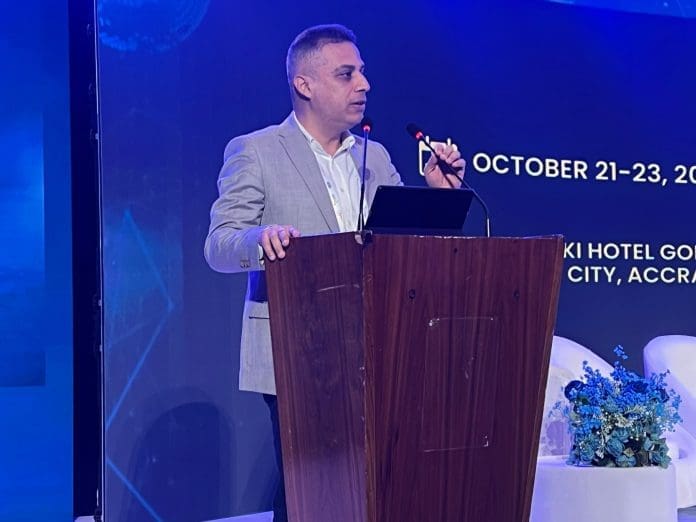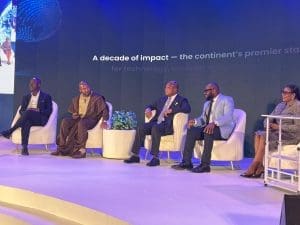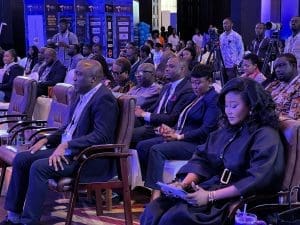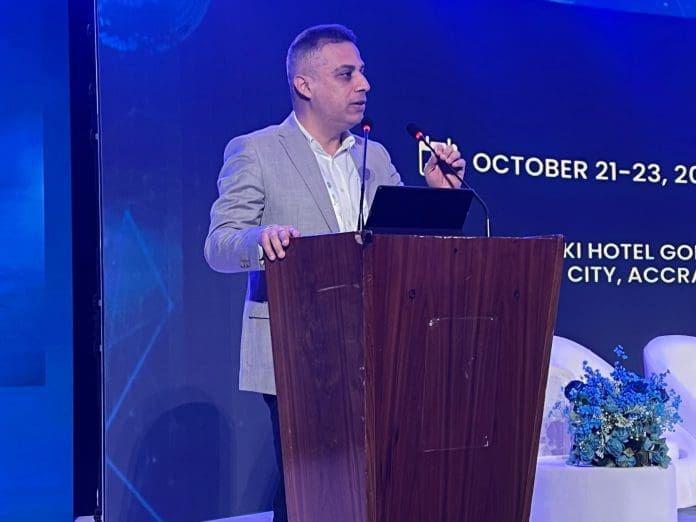
The Chief Digital Officer of MTN Ghana, Mr. Ibrahim Misto, has underscored the need for a collective and coordinated effort to redefine and secure Africa’s digital identity, ensuring that the continent takes full ownership of its data, infrastructure, and technological future.
Speaking at the MOBEX Africa Tech Innovation Conference and Awards 2025, held under the theme “Resetting Africa’s Digital Identity and Sovereignty”, in Accra, Mr. Misto commended MOBEX Africa for a decade of promoting innovation and digital transformation across the continent.
“For far too long, Africa’s digital identity has been fragmented and externally defined. It’s time we build a future where our data, infrastructure, and identity are authentically African, secure, and sovereign,” he said.
MTN Commits $1 Billion to Ghana’s Digital Infrastructure
Highlighting MTN’s commitment to advancing Africa’s digital ecosystem, Mr. Misto revealed that the company has invested over $1 billion in Ghana’s digital infrastructure over the past five years, with $240 million allocated in 2025 alone to expand 4G and 5G networks.
“These investments are not just about connectivity they are about improving lives and driving an inclusive, secure digital economy,” he added.
Innovation at the Core: MTN Showcases Abeena AI and SME Mobile App
Mr. Misto cited the recent MTN Digital Fest 2025, which showcased innovation, creativity, and empowerment. Key highlights included the launch of the Mobile Business App for SMEs to help businesses generate invoices, track transactions, and enhance financial inclusion; the unveiling of Abeena AI, Ghana’s first locally developed multilingual voice assistant fluent in Twi and Ewe; and MTN’s support for the eSports and gaming ecosystem through data packages and sponsorships to empower young people.
Collaboration Key to Achieving Africa’s Digital Sovereignty
Mr. Misto stressed that achieving digital sovereignty requires collaboration among governments, private sector players, and regulators. He called for forward-looking policies, robust cybersecurity frameworks, and investment in local expertise to protect and strengthen Africa’s digital infrastructure.
“Resetting our digital identity is a monumental task that no single entity can accomplish alone. It demands an integrated ecosystem anchored on collective frameworks, cybersecurity, and people empowerment,” he said.
As MOBEX Africa marks its 10th anniversary, he urged African nations to seize the moment to become “architects of their own digital destiny” rather than mere consumers of foreign technologies.
“Africa’s digital future is not something to be inherited it’s something we must build together with pride and sovereignty,” he stated .

Bank of Ghana Champions Innovation and Inclusion in Digital Finance
The Second Deputy Governor of the Bank of Ghana (BoG), Mrs. Matilda Asante-Asiedu, speaking on behalf of the Governor, also underscored the central bank’s commitment to fostering innovation, inclusion, and financial stability in Ghana’s fast-evolving digital economy.
Reflecting on Ghana’s digital progress over the past decade, she noted that mobile money users have grown from 4.9 million in 2015 to 24 million in 2025, with transaction values reaching GH₵3 trillion in 2024, now accounting for nearly half of retail payments nationwide.
Mobile Money Transactions Hit GH₵3 Trillion
“This growth shows that digital payments are no longer an alternative but a core part of our financial system. The challenge now is to expand access, enhance efficiency, and ensure inclusion while safeguarding against risks such as fraud and instability,” she stated.
Mrs. Asante-Asiedu highlighted the Bank’s efforts to strengthen interoperability, support instant payment systems, and promote gender-inclusive financial access, especially for women and small businesses. She further emphasized the need for intentional design of digital solutions that reach underserved and rural populations.
BoG Advances eCedi and Virtual Asset Bill
On Ghana’s progress toward a Central Bank Digital Currency (CBDC), she disclosed that the eCedi pilot, which includes both online and offline functionality, is designed to ensure equitable access for all citizens, including those in remote areas.
She also revealed that the BoG, in collaboration with the Securities and Exchange Commission and the Financial Intelligence Centre, has completed a Virtual Asset Service Providers Bill currently before Parliament. The bill introduces licensing, capital requirements, and anti-money laundering measures aimed at ensuring innovation remains safe and sustainable.
Cybersecurity and Data Protection Remain Central
Mrs. Asante-Asiedu stressed that cybersecurity and data protection are central to the Bank’s regulatory approach, urging financial institutions to maintain strong safeguards, conduct regular incident drills, and uphold consumer protection standards.
“Digital transformation cannot thrive without trust. Privacy by design is not an option it is the foundation,” she emphasized.
She further noted ongoing collaborations such as the Pan-African Payment and Settlement System (PAPSS) and the African Currency Marketplace, which aim to enhance cross-border trade in local currencies and reduce dependence on foreign exchange.
Concluding her remarks, she called for deeper partnerships among governments, telecom operators, fintech innovators, and academia to ensure that Ghana’s digital transformation is inclusive, affordable, and sustainable.
“We must turn today’s conversations into lasting partnerships and practical solutions that serve every Ghanaian,” she said.
MOBEX Africa CEO Urges Africa to Create, Not Consume Technology
The Chief Executive Officer of MOBEX Africa, George Spencer Quaye, urged African nations to take charge of their digital future through innovation, infrastructure, inclusion, and impact.
Mr. Quaye said the time has come for Africa to move from being a consumer of technology to a creator and global player. “Africa will no longer only adopt we will create. Reclaiming our digital identity means owning our infrastructure and shaping our future on our own terms,” he stated.
MOBEX Marks a Decade of Driving Digital Transformation
He noted that over the past decade, MOBEX Africa has evolved from a technology showcase into a force driving digital transformation connecting young innovators to opportunities, fostering investment partnerships, and influencing policy reforms in mobile money and digital finance.
Quaye outlined the “Four I’s” framework Innovation, Infrastructure, Inclusion, and Impact as the pillars for Africa’s digital advancement, stressing the need to translate ideas into measurable change.
“The real success of this conference will not be measured by what happens on stage, but by what happens after,” he said, calling for bold collaboration across governments, entrepreneurs, and investors to accelerate Africa’s digital growth.
Deputy Minister Challenges Africa to Secure Its Digital Future
The Deputy Minister for Communications, Digital Technology and Innovation, Hon. Mohammed Adams Sukparu, also challenged African nations to take full control of their digital future through innovation, inclusion, and data sovereignty.
Ghana’s Digital Agenda Anchored on Skills and Inclusion
He stressed that Africa’s digital transformation must create jobs, drive inclusion, and safeguard citizens’ data. “Our data must remain a national asset, protected by systems that reflect our values and independence,” he stated.
Reaffirming government’s commitment to innovation, he said Ghana will continue working with the private sector, academia, and development partners to position the country as a leading digital hub in Africa.
“Africa must move from dependency to leadership resetting not just our systems, but our mindset,” he added.
However, he commended organisers for driving collaboration among governments, industry, and innovators to advance Africa’s technological transformation.

